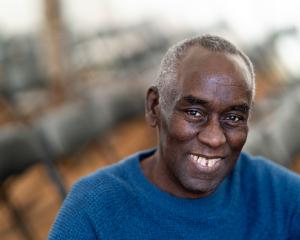
Good Sons is a finely crafted wartime story, writes Jim Sullivan.
GOOD SONS
Greg Hall
Mary Egan Publishing
By JIM SULLIVAN
An ugly portmanteau word "faction'' is used for facts in the form of fiction. "Documentary novel'' is also used, and for New Zealand in World War 1, Robin Hyde's story of Southlander James Douglas Stark in Starkie is perhaps the best-regarded example, but Good Sons stands up well.
It will be judged by some on how well it tells a story while picking its way through a minefield of facts. Others will want a good yarn and to hell with reality, or as Samuel Taylor Coleridge more elegantly put it, they will indulge in "a willing suspension of disbelief'''.
The "accuracy at all costs'' school will find a few quibbles in Good Sons. The title refers to Robert Sutherland, Tom Davis and Frank Wilson, members of the 1915 Waitaki Boys' High School First XV which defeats Timaru Boys' High School by 14-3 (the real game was won by Timaru, 5-nil).
When Robert is heading to Timaru in 1915 he plans to put up at the YMCA (unaware that the YMCA did not exist in Timaru until 1917). When Frank warily eyes the military police who are checking the papers of the soldiers in a pub he is not bothered by the fact that, in general, such patrols were undertaken by the regular police.

However, these examples are just superficial flesh wounds, soon forgotten in the well-told story.
Frank's narration of Oamaru life and its sons coping with adolescent dealings with girls and parents is well-handled, even if the dialogue between fathers and sons and, later, between soldiers and NCOs seems rather formal. Perhaps people did speak that way then.
The boys enlist and find that war changes everything.
Romance, from haystack fumblings to the genuine love affair between Frank and Collette, a French girl, rings true, the novelist calling on the useful device of having an Englishman teaching at Collette's school and thus avoiding laboured sequences of fractured English detracting from the love scenes. Frank befriends a Maori, and a mate, Charlie, pours scorn on Frank's hongi with Puru. Frank's response, "He's wearing the same uniform as us, Charlie. He's one of us as far as I'm concerned,'' is a, thankfully rare, example of the novelist as preacher.
Frank only just avoids death in the battle at Bellevue on October 12, 1917, in which 846 New Zealanders were killed. (Almost every war memorial in Otago bears the name of at least one of them). By now both Robert (executed by firing squad) and Tom (killed at Armentieres) had gone and the rest of Frank's story, requiring a touch of "willing suspension of disbelief'', brings the tale to an emotional and, ultimately, satisfying end.
If the novel must have a message, perhaps it is in the words of Frank's grandfather: "Just remember out of those times something always emerges. It's called hope.''
Greg Hall is an acknowledged expert on the Battle of Passchendaele and the question of how far the historian must push the boundaries on becoming a novelist is suggested by the cover illustration of Good Sons.
It shows three members of the 1912 Waitaki Boys' High School First XV: A.D. McCartney appears not to have served overseas; dental student Cecil Tait, of Oamaru, was called up in 1917 and was in the army for only a month before a medical board found him unfit for service because of a knee problem (he was later a well-known Dunedin dentist); the third boy, Nelson-born Hubert Harley, might just have fitted the novelist's need.
Popular school prefect and cadet officer, Harley joined up in August 1914 and was a captain in the Canterbury Regiment when he was killed in action on October 2, 1916. He was awarded the Military Cross for conspicuous gallantry, the citation reading, "He handled his men with great courage and skill under very trying circumstances.
Later, during an enemy attack, he himself bombed the enemy from the open. Waitaki headmaster Frank Milner would have basked in his story.
Of the Good Sons trio only Tom Davis and Frank Wilson would have met "the Man's'' full approval, but all three were sons as good as the war allowed them to be.
Hall has crafted a fine story around them.
Jim Sullivan is a Patearoa writer.
Win a copy
The ODT has three copies of Good Sons, by Greg Hall, to give away courtesy of Mary Egan Publishing. For your chance to win a copy, email playtime@odt.co.nz with your name and postal address in the body of the email, and ‘‘Good Sons’’ in the subject line, by 5pm on Tuesday, April 25.












